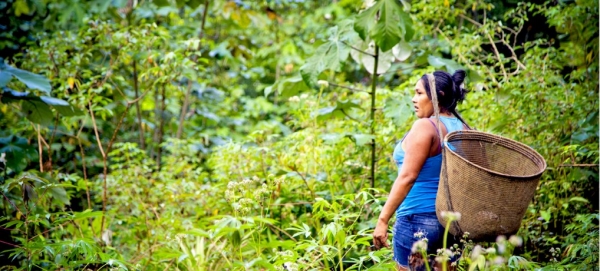Peru’s national indigenous organisation insists that IDB land titling programme in the Amazon must be suspended to avoid violation of international law
- Inicie sesión o regístrese para comentar

AIDESEP, Peru’s national indigenous Amazonian peoples’ organisation, is urging the executive directors of the Inter-American Development Bank and its management to suspend the PTRT3 land titling programme in the Peruvian Amazon.
By Conrad Feather, Forest Peoples Programme
In a letter written to the IDB’s president and executive directors in May 2016, AIDESEP urged the suspension of the PTRT3 project, an $80 million land titling programme, while a formal complaint about the project was ongoing. AIDESEP said that without a project re-design, there was a serious risk that the programme would undermine indigenous peoples’ land rights and operational procedures of the Inter-American Development Bank (IDB).
From 1-6 June 2016, AIDESEP representatives travelled to Washington DC to engage directly with Bank staff and executive directors and further explain their concerns. This visit represented the latest in a series of proactive efforts that AIDESEP had made to engage constructively with both the IDB and the Peruvian government since plans for the project came to light in 2014. Despite multiple letters and meetings with representatives of the Bank and the Peruvian government, AIDESEP says its principal concern remains unaddressed. It says the project represents a serious risk to approximately 20 million hectares of untitled indigenous lands, including where more than 1,200 communities have outstanding land rights applications. AIDESEP points out that instead of prioritising the recognition of indigenous peoples’ land rights, the project focuses on securing the land rights of more than 700,000 individual agricultural landowners with no safeguards in place to prevent overlaps with untitled indigenous lands.
In a formal complaint to the IDB’s own Independent Consultation and Investigation Mechanism (ICIM), which was filed in August 2015, AIDESEP outlined how this constituted a violation of the IDB's own operational procedures, including its obligations to respect international norms1. These operational procedures establish that, prior to actions that might affect indigenous peoples’ land rights, States must first ensure that their lands were titled.
In this vein, AIDESEP cited the jurisprudence of the Inter-American Court of Human Rights (IACHR) which had clearly established that States had an obligation to attend to indigenous and tribal peoples’ land claims by delimiting, demarcating and granting title over the people’s traditional territory before authorising new plans for investment or development of natural resources which could affect their territory. The IACHR has also held that States are obliged to abstain from any act that might affect indigenous territories until land titles are issued.2
While AIDESEP does not question the rights of these farmers to secure land rights, it points out that the social conflicts, deforestation and land trafficking that afflict the Peruvian Amazon are principally due to the ongoing failure of Peru’s government to first ensure legal security for the land rights of more than 1,200 indigenous communities whose traditional lands remain unprotected and vulnerable to invasion and expropriation.
In the letter to the Bank’s president Luis Moreno, president of AIDESEP, Henderson Rengifo, said: “We insist that the whole project is completely suspended… until a solution is found for our complaint and a consensus is reached to avoid violation of OP703 and 765. Only then, once we have clear guarantees, can we move forward. As it is, the PTRT3 will become entrapped in (land) invasions and conflicts.”
The project is already being implemented and was signed off by the IDB and its Peruvian government counterparts in February 2015 despite AIDESEP’s concerns. Finally, after numerous failed promises to integrate these concerns, AIDESEP filed its formal complaint to the ICIM.
The complaint is now entering a formal consultation phase during which the ICIM will facilitate dialogue between the parties to assess if an agreement can be reached. On 2 May 2016, the ICIM published its assessment on the viability of the consultation process.
AIDESEP’s response highlights that if there is a “continued lack of political will on the part of the Ministry of Agriculture, the IDB and the Ministry of Finance to correct these obvious design flaws then they will be responsible for the failure of the consultation and the transition to the compliance and verification phase where the entire project will be paralysed while the violations are investigated and sanctioned.”
- - - - - - - - - - - - - - - - - - - - - - - - - - - - - - - - - - - - - - - - -
► AIDESEP is invoking OP765 of the IDB’s safeguards on indigenous peoples which explicitly prohibits the ‘financing of any operation that fails to comply with the “applicable legal norms” and safeguards articulated in the policy’. The applicable norms include ‘national legislation’, ‘international norms’ (such as the jurisprudence of the Inter-American system and international treaties) and ‘indigenous juridical systems’2. I/A Court H.R., Case of the Saramaka People v. Suriname. Preliminary Objections, Merits, Reparations and Costs. Judgment of November 28, 2007. Series C No. 172, par. 194(a) “Until said delimitation, demarcation, and titling of the Saramaka territory has been carried out, Suriname must abstain from acts which might lead the agents of the State itself, or third parties acting with its acquiescence or its tolerance, to affect the existence, value, use or enjoyment of the territory to which the members of the Saramaka people are entitled, unless the State obtains the free, informed and prior consent of the Saramaka people.”

Comentarios via Facebook